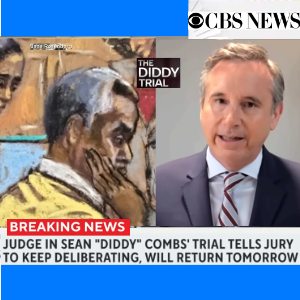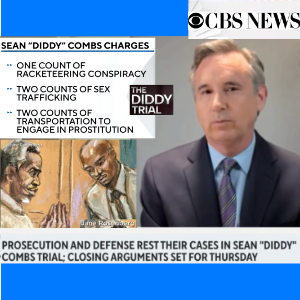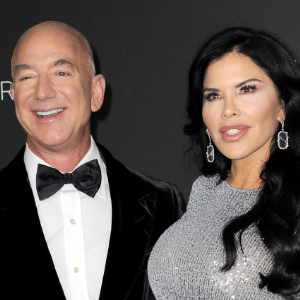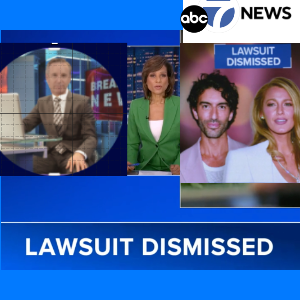
Celebrity Lawyer Explains Diddy’s Trial Verdict
[Source: CBS]
Celebrity lawyer and legal analyst Christopher C. Melcher, who is ranked as a best family law attorney in California, explains the verdict in the Diddy federal sex trafficking and racketeering trial.
Celebrity attorney Chris Melcher called the verdict in Sean “Diddy” Combs’ sex trafficking and racketeering trial the best possible outcome for the defense, noting that Combs avoided a potential life sentence under RICO charges and now faces only lesser convictions that could result in probation. Melcher explained that the jury likely reached a compromise verdict and said it’s very possible Combs could be released immediately due to time already served.
Host:
… Joing us is CBS News legal contributor, Jessica Levinson, for us. Jessica, thanks for your time. I want to know about your take on the verdict that the jury reached.
Diddy Defense Wins
Jessica Levinson: I think this has to be seen as a big win for the defense. When it comes to the most serious charges, Sean Combs was not found guilty. And when it comes to those lesser charges of transporting somebody for commercial purposes, for prostitution, there were convictions. We should be clear that these are still federal criminal convictions and it is still serious to be convicted of federal crimes. But in terms of the overall case and what Sean Combs was charged with, certainly this is a win for the defense.
At this point, what we’re looking for is seeing whether or not Sean Combs will be released essentially almost immediately, maybe today, or if he will be detained until sentencing, and then we’re looking forward to see what sentencing is going to look like. The prosecution has said that they’re going to ask for a very lengthy period of time. We don’t know exactly what that is. The defense obviously wants no time whatsoever. So we’re going to look at, there will be an exchange of memorandum where the prosecution will say, “This is why we think that he should be behind bars for a long time. These are all the aggravating factors.” The defense will say, “Here are all the mitigating factors, and we actually don’t think that he should be behind bars for that long.”
Host:
Jessica, I have to ask you, from your experience dealing with cases in your entire career, what are the chances here that he could actually walk free and not face any time in prison and only get probation?
Will Diddy Walk Free?
Jessica Levinson:
Well, obviously two different things, meaning will he be free prior to sentencing and then will he get zero sentence in the sense of, will he get zero time behind bars? I shouldn’t have said zero sentence. So I think it is possible. I will say it’s within the judge’s discretion. The judge will consider all of the evidence that the jury heard and whether or not some of the evidence, which does paint Sean Combs in a troubling light, is related to the counts on which he was convicted. I also think it is possible that we could see some minimal jail time. I do want to remind everybody that he has been in prison for a long time. There was, of course, pre-trial detention in this case. So even if he is sentenced to a number of months, it could be that the judge concludes, basically, “You’ve already served your time.”
Host:
All right. Jessica Levinson, we appreciate your insights on this case. Thank you so much.
Jessica Levinson:
Thank you.
Host:
And we are joined now by Chris Melcher, a former sex crimes defense attorney and partner in Walzer Melcher Yoda LLP, which is ranked as best family law firm in Los Angeles, CA. Chris, we want to get your take on the verdict and the Sean Combs defense. It seems clearly his team is very happy about the verdict here.
Chris Melcher:
Well, absolutely. This was the best that he could have hoped for. Under the RICO and sex trafficking charges, he could have been facing a life sentence. And under the charges that he was convicted of, or the jury reached a guilty verdict on, it really could just be probation. So this was the best that he could hope for. I think that the prosecutor had probably overcharged this case with the RICO, where it’s a criminal enterprise that we usually see applied to the mafia.
And here this was an enterprise of one man who was doing some really depraved things, but everyone was working for him and doing his bidding. It wasn’t the traditional type of RICO case. So I don’t think that really made a lot of sense to some of the jurors. And now the transportation charge, okay, sure, he’s found guilty of that, but he’s also served a significant amount of time in custody already, and it would seem appropriate that he could be walking out that door today.
Speaker 1:
And we were talking to one of our correspondents, Jericka Duncan, outside the courthouse earlier, and she mentioned that even when the verdict came down, there were some people out there who were surprised by it. Your take from your experience dealing with cases like this, were you at all surprised by this verdict?
Chris Melcher:
Well, this is the thing about juries, they’re unpredictable. But what we heard from the notes were that there were firmly held beliefs by some jurors and an inability to reach a verdict on the RICO charge. And somehow, a good night’s sleep allowed them to reconcile some of these things. And what we see is a compromise or negotiation happening in the jury room because they do want to reach a unanimous verdict.
They don’t want to have the seven weeks of their life go for nothing and have the victim and defendant have to redo the trial, which would’ve been the consequence, potentially, of a deadlocked jury. So they had to agree on something. And what the compromise was is, “Hey, let’s go for the transportation charge. Guilty on those two counts, not guilty on everything else.” And that does make some sense because he will be held accountable for his conduct, but not at the serious levels that the government had hoped for.
Speaker 1:
And you talked about how this is a victory for the defense. Any chance that they will come back and try to basically appeal this verdict?
Will Diddy’s Verdict be Appealed?
Chris Melcher:
Well, sure, there can always be appeals, but he had a fair trial. There were lots of opportunities to cross examine witnesses. He developed that information. The judge made appropriate rulings. So I don’t think that there’s any likelihood of a successful appeal. Had he been convicted on the RICO charge, maybe there could be something there. But on the transportation, that seemed to be firmly established by the testimony that there were transportation of one or both of the victims and these other workers here that he retained across state lines. That would be very difficult, I would think, to win an appeal.
Speaker 1:
Yeah. And I want to ask you, I want to go back to that racketeering charge because from the very beginning, the question was whether or not prosecutors were able to make their case there, showing the jury that he is, in fact, or should be guilty for that charge. Why is it so difficult to get a guilty plea when it comes to racketeering?
Chris Melcher:
Well, it has to make sense to the jury. These are not attorneys or judges. These are regular people who are just being instructed on the law and saying, “Okay, is this a criminal conspiracy, two or more people engaged in a criminal enterprise involving specific crimes?” Well, that doesn’t really fit what we saw here. It’s unbelievable the kind of things that he was doing, but it was really an enterprise of one.
It didn’t have the features of the mafia or cartel. So I think that that just wasn’t understandable, that prosecution did the best that they could in closing argument to explain it, but it was just a bridge too far. And the same for the defense saying that these were somehow romantic evenings that we would all enjoy to participate in, no way. That didn’t make sense either. So the jury had to use their own common sense and apply that towards reaching a verdict.
Speaker 1:
And, Chris, I know you cannot read the judge’s mind when it comes to what’s going to happen next, but there is that question of whether or not Sean “Diddy” Combs is going to be allowed to go home today. What’s the possibility of that actually happening?
Chris Melcher:
I think that is a very real possibility. And the judge was signaling that and saying, “Hey, show me, prosecution, a case where somebody who’s been convicted of transportation has even been in pretrial confinement for this long.” And many people get out on bail and they don’t have to suffer imprisonment or confinement before trial. He has no criminal history. He was acquitted of all these very serious charges that the prosecution made against him. He’s going to put up a substantial bond. There’s no risk of him fleeing when he’s almost served the entire potential sentence already pretrial. And the concerns about witness tampering don’t exist anymore because the witnesses have already testified. So I would think that all signs, in my view, point towards him walking out that door today.
Speaker 1:
I also wanted to ask you about sentencing. How long before we officially know what the judge is going to decide on this?
Diddy’s Sentencing Timeline & Guidelines
Chris Melcher:
Well, generally, they take their time on that. There’s going to be pretrial interviews or pretrial services interviews. And looking at his history, the motivations for why he did these things, he can now explain there was a drug issue. Maybe there were other things going on in his life that made him engage in this conduct, so he would try and explain it as what we call mitigating factors. He would definitely advertise to the fact that he has no criminal history before.
He’s going to talk about things that he learned while he was in detention and why he’ll lead a different path going forward. And the prosecutor is then going to want to put on these aggravating circumstances. So that may happen, let’s say in a month from now, we could see a hearing on that. There’s sentencing guidelines. This could go anywhere from no jail time, meaning probation, all the way to 10 years in imprisonment. The guidelines seem to be around 15 to 21 months of imprisonment, and he’s already been in custody since September of last year and will get credit for that time, so he could potentially be sentenced to time served.
Speaker 1:
Okay. Chris Melcher, top family law attorney, thank you so much for joining us today and for your insight on this case. Appreciate your time.
Make sure to follow Chris on Twitter at @CA_Divorce.
©2025 CBS. No claims made to copyrighted material. Aired 7/11/25.
5 More interviews with Celebrity Lawyer and Legal Analyst Christopher C. Melcher
More from Christopher C. Melcher on Diddy's Trial

Celebrity Lawyer Explains Diddy’s Deadlocked Jury





